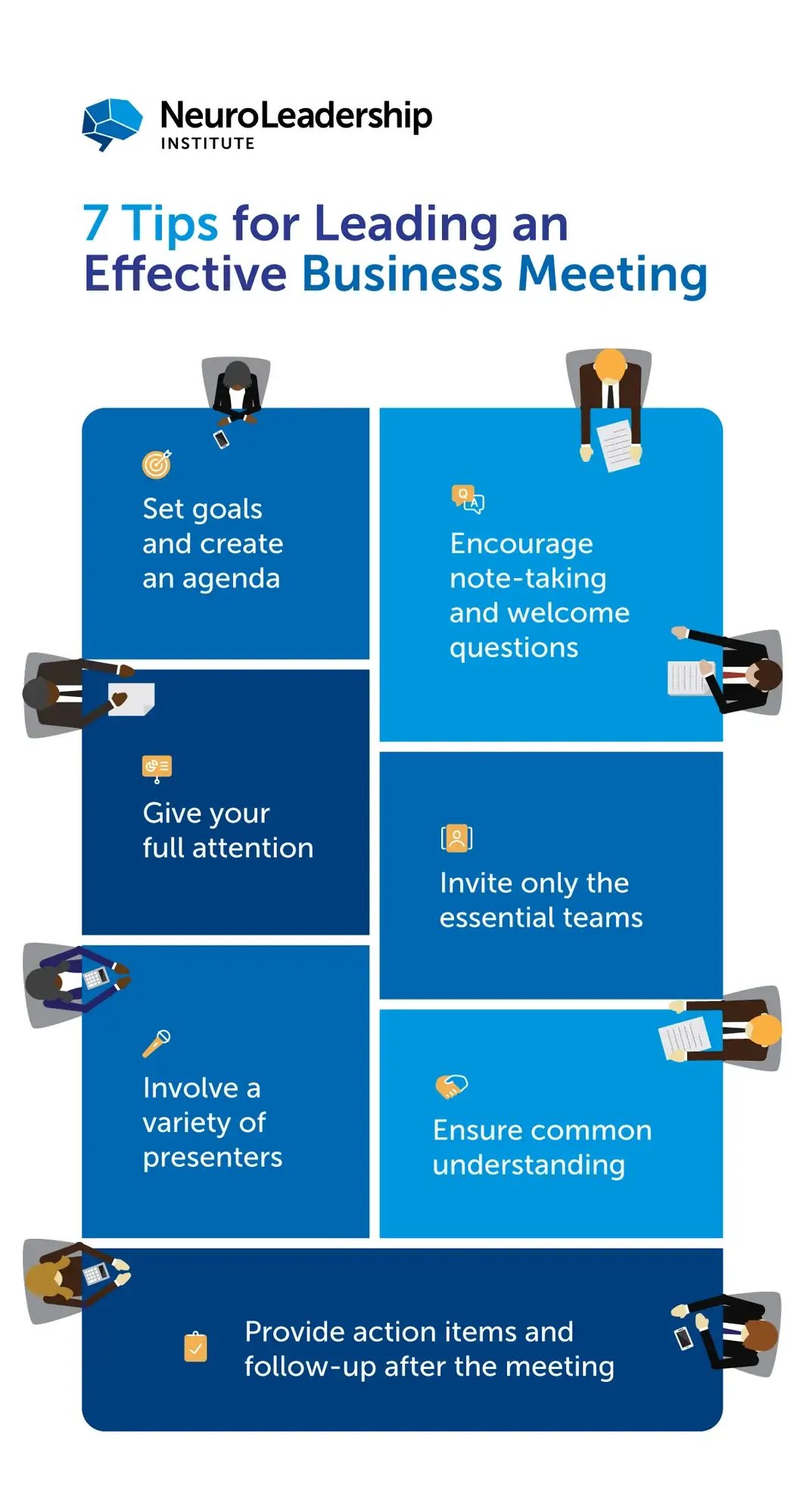
How to Lead an Effective Business Meeting
Leading business meetings can be a difficult task. You want to communicate with your team in a way that both informs and motivates them. Effective leadership skills are essential to leading an effective meeting. The good news is that science can offer helpful tips and tricks to leading an effective business meeting for your team.
What Is Effective Leadership?
Leaders are responsible for monitoring progress and making sure that their teams complete tasks. However, there is more to being a leader than making sure employees complete jobs on time. Leaders motivate, inspire and guide their employees to reach goals. They can have a significant influence on how people feel about their work and their value at a company. Effective leadership is made of the following qualities:
Clear Communication
Effective leaders work to communicate with their employees clearly. This includes both speaking and listening. An effective leader listens to their employees to hear and understand their ideas and concerns. They communicate clearly to inform employees of expectations, resolve misunderstandings, facilitate collaboration among team members and motivate their employees.
Teamwork
An effective leader works with their employees to accomplish goals as part of the team. They have a clear understanding of the business operations that their team carries through. An effective leader remains involved and invested in business operations and supports employees by respecting their concerns.
Accountability
Accountability is an important leadership quality. Leaders are responsible for their team and therefore have to hold themselves accountable for business operations and the well-being of their employees. Effective leaders lead by example and embody the same qualities and work ethic that they expect from their team members.

Tips for Leading an Effective Business Meeting
There are many steps you can take to make sure your team gets the most out of your meetings. It's important to understand what you want to accomplish during the meeting and clearly communicate it to your team. It's also important to understand that neuroscience and the way the brain works play a part in how your employees develop new skills and form new habits. You can lead an effective meeting with the following tips:
1. Set Goals and Create an Agenda
Before you plan the details of a meeting, set goals for what you need to accomplish. If you plan your meeting and run your meeting with these goals in mind, you are much more likely to accomplish everything you need. Setting goals will also help you feel prepared as you plan and lead your meeting.
Creating a clear plan for the meeting will also be a big help. Will you have multiple speakers? If so, who? Who will present each topic? What are the topics that need to be covered? How long does each presenter need? Creating an agenda is a great step to keep everything organized, and it will help you cover all of your planned topics without running over your allotted time.
It can also be helpful to give each member a copy of the agenda prior to the meeting. Giving your members some of the information beforehand gives them the opportunity to review everything and prepare anything they need. It allows your members time to go over what will be covered and form any questions, comments or concerns they may have regarding the topics.
An agenda also keeps everyone focused on what's important. Presenting your meeting with specific goals can give everyone an idea of what absolutely needs to be covered, so it could help filter out any unnecessary conversations.
2. Encourage Note-Taking and Welcome Questions

Encourage your attendees to ask questions. Your team will be much more efficient if they feel they can express any questions, concerns or confusions they may have. You can even devote extra time at the end of the meeting for your team to express questions or concerns that they may have. This will make them feel included and communicate to them that you value their thoughts.
Questions and concerns are important, but they can cause distractions if they occur frequently throughout the meeting. Encourage everyone to take notes during the meeting, including any questions or comments that they want to share. Encouraging attendees to take notes and save comments for the end of each topic can reduce frequent distractions during the meeting.
3. Give Your Full Attention
If you are running a meeting, it will reflect badly if you are distracted, and it could cause your attendees to lose interest in what you have to say. Give your full attention to your presentation and your team. You should remove anything that could be distracting by turning devices off, removing any unnecessary materials and encouraging your team to do the same.
Even if you or an attendee have an open laptop with work-related material, it could be tempting to work rather than listen. Everyone needs to be able to give their full attention to the meeting.
4. Invite Only the Essential Teams
Be selective of who you invite to the meeting. If your meeting is intended for your marketing team, you wouldn't want to invite the IT team. Invite only the teams that need to hear your presented topics. This will eliminate confusion and ensure that the meeting attendees are interested in what you have to say. It will also save space in your designated meeting area.
5. Involve a Variety of Presenters
If you typically lead the meetings by yourself or allow the same person to lead them, it can become very routine and uninteresting. Consider inviting a variety of presenters to lead different meetings. If you change speakers from time to time, the change in routine can be the difference in your team's response to meetings.
6. Motivate Your Team
It's easy to go into a meeting and list all the tasks that your employees need to complete. However, it's important to both inform them and motivate them. Remind your team that they are valued members of the business and that what they do matters. Use your meeting as an opportunity to cheer your team on and encourage growth so that they feel excited about the work they do.
7. Provide Action Items and Follow-Up After the Meeting
Action items are actions your team needs to complete following a meeting. When you wrap up the meeting, you will definitely want to touch on the action items to make sure everyone understands what they are tasked to do.
Once the meeting is over, you still have one more task to complete. It's important that you follow up with your members following every meeting. This allows you to clearly communicate about and check the progress on any action items that you assigned as well as recap the meeting for anyone who was unable to attend. It's helpful to distribute a meeting recap in written form. This can serve as a guide for anyone who missed the meeting due to unforeseen circumstances or those who may just need a little refresher later on.
Build Your Leadership Skills With Brain-Based Coaching
Leadership skills are important, especially when you are leading a business meeting. Effective leadership requires many important qualities. In order to motivate your employees, it's important to understand the neuroscience behind how people think and how it effects their learning. The more you understand how the brain works, the better you can communicate with and lead your team.
The NeuroLeadership Institute offers Brain-Based Coaching programs to help leaders learn the science behind effective coaching. If you're ready to facilitate positive change within your business and better communicate with your employees, contact us to learn more about how we can help you become a better leader.

